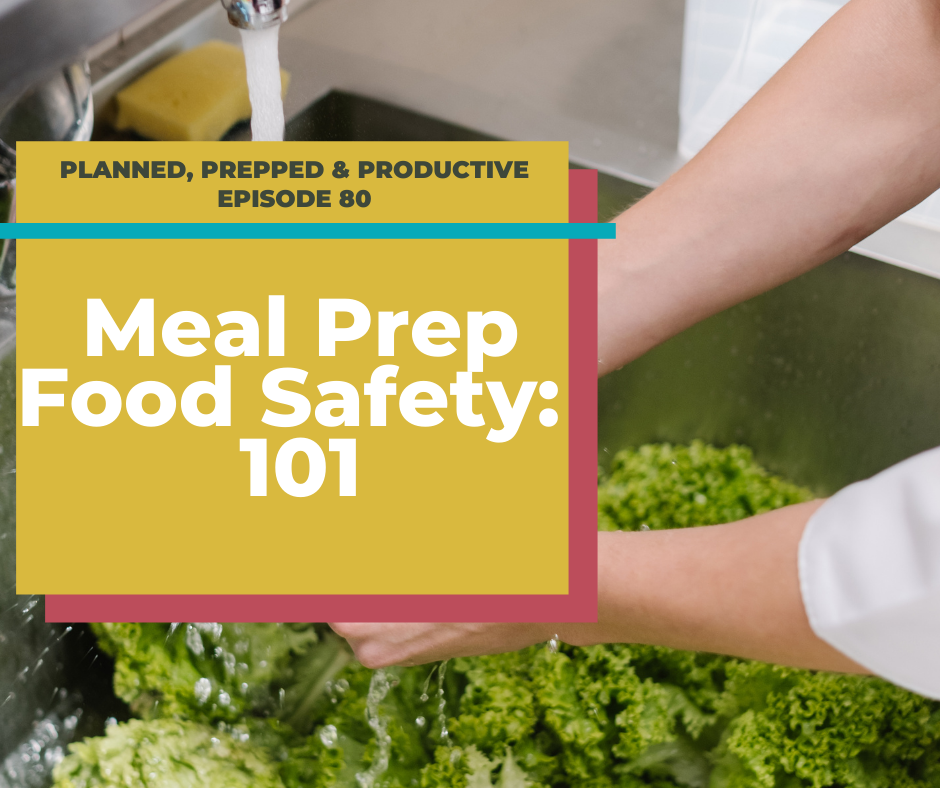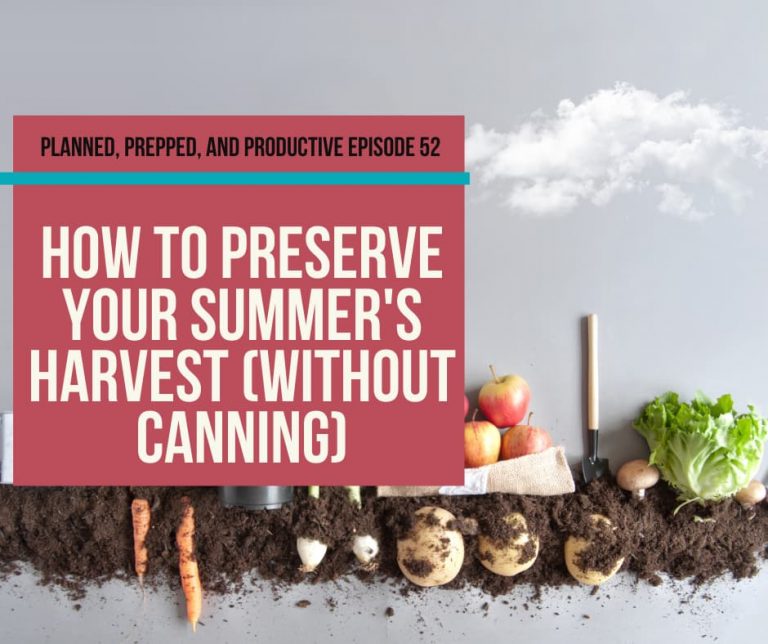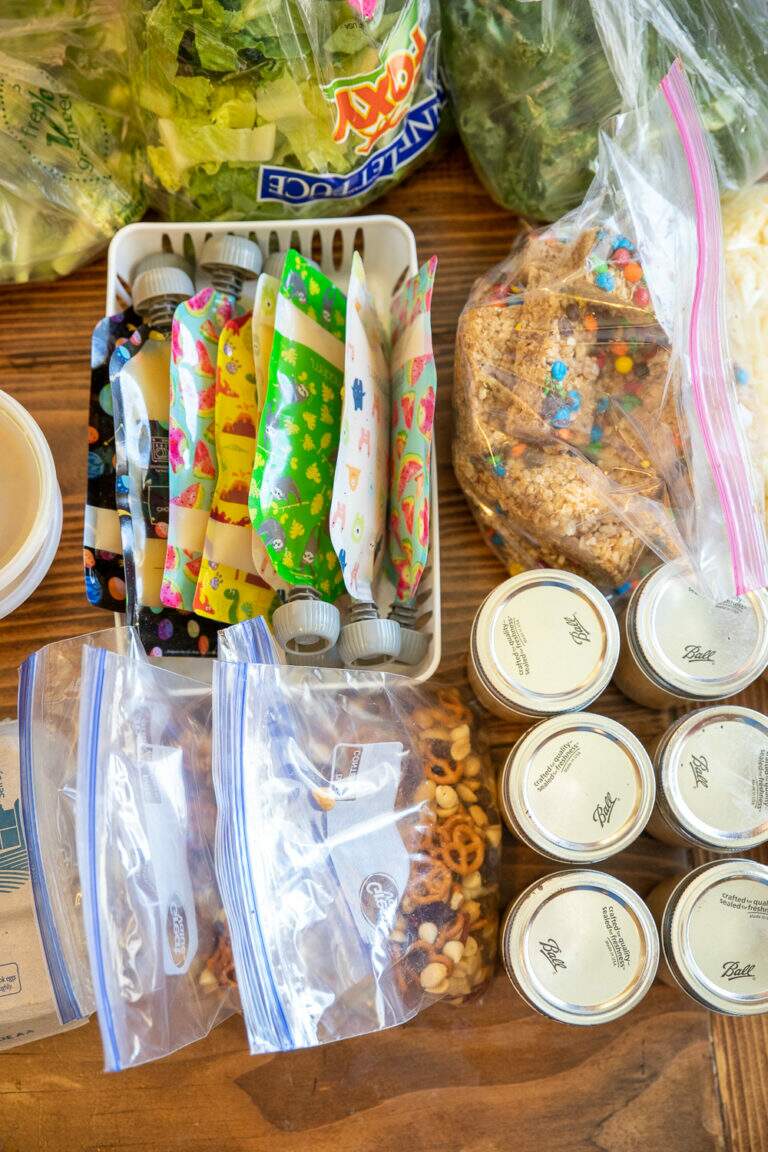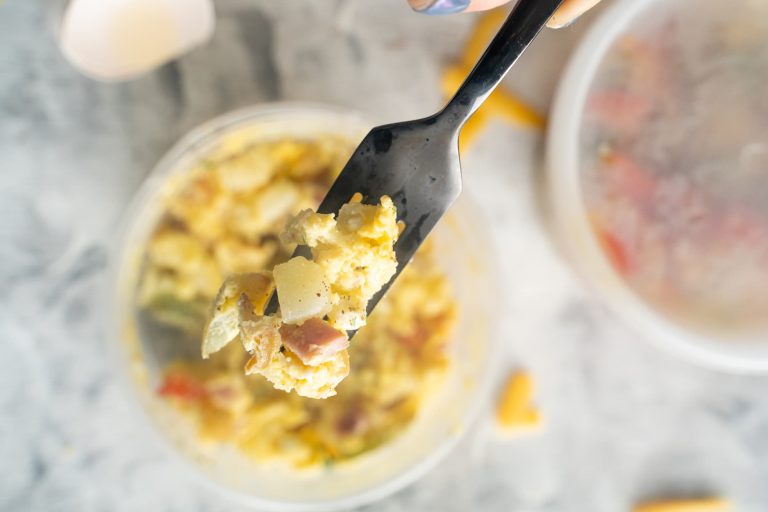Meal Prep Food Safety: Meal prep with confidence!
It’s not the sexiest of topics, but meal prep food safety is important and can help give you confidence on your meal prep journey. Get educated on how to care for your food safely so you can feel confident in rockin’ your meal prep!

You’re planning a party you’ve got the recipes, the decorations, the music and you’re ready to go.

You probably don’t even give a second thought to how you’re going to keep all of the food safe that you’re going to serve…
Food safety is not fun or sexy…but it’s SO important, and I know it can keep a lot of you from meal prepping because figuring out how to prep food safely can be overwhelming.
So let’s keep your kiddos, families, and all of those guests at your parties safe WHILE still enjoying meal prepped food.
The format for this episode will be a little bit different.
We’ll start out by talking about just a few things to do to prepare, serve, and store food safely so you’re taking care of the food in the best way possible. Then we’ll jump into some frequently asked food safety questions so you’ll feel confident that you’re prepping your food.
Before we dig in…I’m going to interrupt this episode with an official launch date for the meal prep in minutes MINI course, which is a precursor to the master meal prep course. I promised a launch date, and ultimately forgot last week BUT I’m officially setting June 30 as launch day for the mini course!
It will be a super comprehensive DEEP dive into how I meal prep a week’s worth of meals, recipes AND video instruction included. So if you’ve been listening but you want it to be done for you, this is literally as close as you can get. A full meal plan, recipes, meal prep schedule, and grocery list ALL done step-by-step for you!
Meal Prep Food Safety
How to prepare food safely
- Cook foods to a safe temperature
- Avoid cross-contamination
Serve food quickly and correctly
- Get food out of the refrigerator right when you need it
- Serve hot foods in slow cookers or warmers and cold foods in a bowl of ice.
- Throw away foods that have sat out for two hours (or 1 hr in 90 degree heat)
Cool quickly
- Serve food and cool it as quickly as possible
- Move to smaller containers to cool
- Chop large cuts of meat smaller so they cool quickly
Freezer meal prep FAQ
How long are leftovers/meal prep good in the fridge?
With all the meal prep options out there the USDA has updated their guidelines on leftovers. They recommend tossing your leftovers after 4 days. They recommend if you want to meal prep, to do it twice a week instead of the popular cook once eat all week.
Something to keep in mind is that this is for cooked foods that are stored in the refrigerator.
This is why freezer meal prep OR pre-chopping but not pre-cooking is more up my alley for meal prep, but we’ll talk about this later.
How long is frozen meal prep good?
Food that has been frozen 0 degrees F or below is SAFE indefinitely. Those temperatures are low enough to keep pathogenic bacteria at bay. You still may want to consider rotating them more frequently due to quality (I’m dropping a link to how the freezer can affect the texture and quality of your frozen food that’s awesome!)
So, rotate as often as you can, but don’t stress too much about food safety when it comes to frozen food as long as you reheat it properly (to 165 degrres)
Can I refreeze leftovers?
I’ve gotten this question a lot, and the good news is YES you absolutely can refreeze leftover leftovers.
The key here is taking care of your leftovers well like we talked about in the first segment of this episode of the podcast.
If you reheat your leftovers, let them sit on the counter for a few hours, and then refreeze them…probably not a great idea. But if you quickly reheat, and then re-freeze then this is totally okay.
How can I tell if my food has gone bad?
There’s two different types of bacteria, pathogenic bacteria and spoilage bacteria. Spoilage bacteria is usually fairly obvious, you’ll notice changes in appearance, taste, or texture and you likely won’t want to eat it, but even if you DID you probably wouldn’t get sick
Pathogenic bacteria is sneakier. Pathogenic bacteria doesn’t necessarily change the quality of the food, but it can make you sick. For this reason you should just stick to the guidelines and throw food away even if it seems “fine.”
What are some easy ways to prevent cross-contamination?
Preventing cross contamination is a pain, especially when it comes to raw meat. To prevent it, first I try to get all my prepwork done before I even get meat out so that there’s no chance for cross-contamination.
The second idea I have I got from the lazy genius and she suggests that you pour cooking ingredients like oils that you will need into their own containers (instead of leaving it in the bottle) so if you have chicken juice on your hand it’s no big deal, you can just grab the small container, dump it in, and then sanitize your containers when you do the dishes (Rather than getting chicken juice on the whole thing of olive oil!)
Another great practice to get into is to assign certain cutting boards to meat and others to veggies. You can do this by labelling the corners with a sharpie or assigning colors.
How long does (enter food item here) last in the fridge?
I could spend this entire episode discussing the shelf life of individual foods, but instead I want to introduce you to an awesome resource! The USDA has created the Foodkeeper app that tells you how long essentially any food you can think of will last under different storage conditions! It can be a real lifesaver especially as you’re starting out!
How can I meal prep effectively if leftovers last only 4 days?
Freezer meal prep my friends! Or pre-chopping without cooking. I keep the majority of my pre-cooked meal prep in the freezer so I can use it even if life gets crazy, which it DOES.
What foods pose the greatest food safety risks?
Raw or undercooked foods are very risky (sorry sushi lovers) this is why cooking the food to a proper temperature the first time is so important.
Typically we think of meats as being the biggest culprit (and they can be a big culprit) but if you remember the romaine lettuce disasters than you know that ANY food can get contaminated or cause foodborne illness so it’s best to wash everything and prepare everything as safely as you can.
Alright friends, I kept it quick and hopefully answered YOUR burning questions about meal prep food safety, if not I’m always open to answer questions! Shoot me an email anytime amanda@callmebetty.com!
Next week we’re talking about feeding kids in summer…because if you’re like me the “mom can I have a snack” has already begun and feels like it’s never going away.
In addition to this episode I’m releasing a brand new freebie so you can steal my summer meal and snack schedule (again with recipes + meal prep ideas) to keep you sane while feeding the hungry beasts all summer long! I just started implementing it this week, and it has been a total game-changer!
Other episodes you may like:
How to store, cook, and reheat meal prep so it tastes amazing






